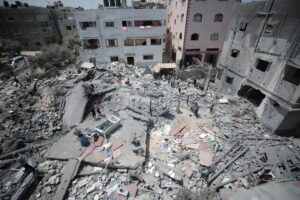
Hamas Refuses All Offers, War Resumes with Air Strike
The fragile ceasefire between Israel and the Hamas terrorist organization has come to an end, following Hamas’ refusal to uphold its commitments to release additional Israeli hostages. Israeli officials confirmed that after days of negotiations, during which mediators attempted to extend the quiet, Hamas reneged on agreed terms, prompting Israel to resume military operations aimed at dismantling Hamas’ capabilities.
The ceasefire had been brokered by international parties, including Egypt and Qatar, seeking to bring temporary relief to both sides after weeks of intense conflict. Under the terms, Hamas had been obligated to release several Israeli captives, primarily women, children, and elderly individuals, who had been abducted during the terror group’s brutal incursion into Israel months prior. In exchange, Israel had agreed to pause its defensive operations and facilitate the transfer of humanitarian aid into Gaza, ensuring provisions for civilian populations.
However, Israeli leadership reported that as the ceasefire neared its potential renewal, Hamas refused to release a new group of hostages, effectively violating the terms of the arrangement. As a result, the Israel Defense Forces (IDF) resumed their carefully targeted airstrikes and ground operations in Gaza, focused specifically on Hamas infrastructure, weapon stockpiles, and command centers. The Israeli government reiterated that its primary objective remains the dismantling of Hamas’ terror capabilities while safeguarding innocent civilians to the greatest extent possible.
Prime Minister Binyamin Netanyahu emphasized that Israel remains committed to securing the release of all hostages held by Hamas and will not cease efforts until every captive is safely returned home. The Israeli leadership further stressed that the responsibility for the continued suffering of civilians in Gaza rests squarely on Hamas, whose refusal to release the innocent captives perpetuates the conflict and places additional strain on the region’s population.